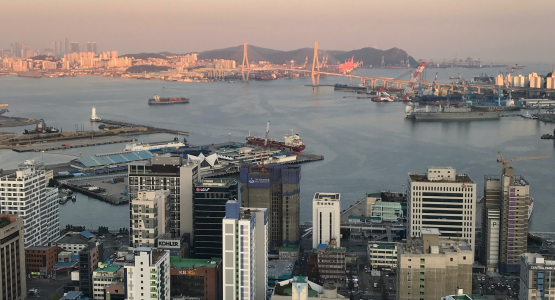Busan is the second largest city in the Republic of Korea with a population of 3.5 million living within a 770.07km² area, which accounts for only 0.8% of the whole Korean Peninsula landmass. The city's deep harbour and gentle tides have allowed it to grow into the largest container handling port in the country and the fifth busiest international port. Moreover, its natural endowments and rich history have resulted in Busan's increasing reputation as a world-class city for tourism and culture.
The city of Busan opened its modern-day international port in 1876. In 1950, the port city was designated and served as the provincial capital during the Korean War, and continued its growth as the centre of national industrial development in the aftermath of the war. Busan has developed itself into an undisputed hub in Northeast Asia for the cinema industry and international convention sector. Beginning with the Busan International Film Festival (BIFF), which was inaugurated in 1996, the city has successfully hosted a number of major international events, such as the 14th Asian Games Busan (2002), APEC Economic Leaders' Meeting (2005), and ASEAN-ROK Commemorative Summit (2014 and 2019).
Regarding the ICC, Busan Metropolitan City continues to implement several policies and services focused on securing relevant infrastructure and markets in order to support balanced growth and the development of start-ups and existing SMEs. The city government seeks sustainable growth for its local economy through the creation of new jobs and providing tailored employment support. Furthermore, as South Korea is already well-equipped with world-class internet and an IT infrastructure network, Busan offers an ideal environment to establish an e-Government system based on the digitalization of administrative tasks. Every task carried out by the Busan Metropolitan City government – from planning, evaluation, knowledge to feedback – is managed and stored within a portal system. The system was developed by the national government and has been adopted by all local governments in the country. The system improves work procedures and the quality of citizen services as it enables standardization and quantification, as well as enhancing efficiency.
Urban waste management is a challenge many big cities are facing as a result of industrialization and the subsequent increase in population. Since the Volume-rate Garbage Disposal System was first implemented in South Korea in 1995, Busan citizens have practiced environmentally-friendly habits in their everyday lives and benefitted from the different waste treatment facilities established throughout the city. Today, Busan has one of the most advanced recycling and domestic waste treatment systems in Asia as high-rise buildings constitute the majority of the city’s residencies.
Although Busan strives to deliver many impactful initiatives, the city is still dealing with conventional urban challenges. One prominent issue is the decreasing youth population and increasing elderly population. To overcome these challenges and uphold its leading smart city status the city is implementing many economic policies and projects at the local level.
Busan Metropolitan City deeply wishes to share its accumulated experiences and pursue mutual growth together with EU cities.





